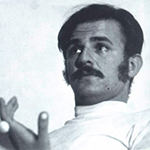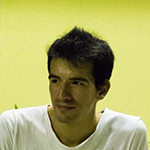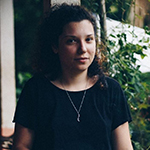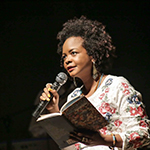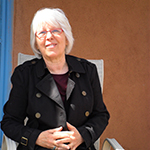the squealing hinge of anarchy
Between the night and the moon,
slip the men needles
that the insomnia hones.
Between the moon and the tombs,
the men march.
Between the moon and the palm tree’s umbra
they slip, the men of the penumbra
dream
of the men carrying rifles over their shoulders
and the tangles of byways and songs
of the men brambles of their dreaming
of the men footing the stony terrain
of the men reascending the night
over the countryside of the night,
of the men beard and revolt entwined,
arms of men,
they slip and sow the auroras,
whips whipping the days.
O men resistance fighters
traversing the twilight
Men,
already you are the arms of the aurora
and the tree of day
Men
do not forget women,
roots and crown of the day.
Winch animal,
we extend the rope of the resistance
between the deserts and the mountains
across the lower back and the vertebrae
of the dunes and stony terrain.
You ask me what becomes of the well?
The well is our abyssal gaze.
Woe to every last city and prison
that would set themselves between our assailing
cries,
impulse of cheetahs
looting their own lightning-flight.
You, the engineer of I’m unsure which
intertwining,
now I know you!
It’s you, the brain without soul,
computers of the World Bank.
And you as well I see you
its double, its accomplice,
the key to the strongboxes of the IMF.
Oh you who capitalized from the expulsion
of the live skeletons of my brothers,
ripped away and thrown out by the excavators
like a pile of bone onto the landfills,
by monotonous decrees recited to the crowds
of Banana Republics and their cannibalistic
chefs,
who observe them while salivating,
yes, you, do not fret.
You are going to drink us,
we the cancer and its AIDS thirsting
within the tempest of sand
and within the embers of our lands
which fear no hurricanes from the
Stock Exchange.
Hey you, the ex-colonial schoolteacher turned
conquistador,
and you, the ex-legionnaire, and you the ex-priest
of the pacification castration of ours,
and you the ex-flesh-peddler rehabilitated as
Gestapo,
each an epoch of ex-inflatable sex organs,
we are on the verge of snipping the hocks and
nerves
of your virility.
Woe to you, brother of ours,
you, ear-throat of the parrot,
reduced to a mercenary’s lifestyle.
Yes, it’s to you that I speak,
apprentice chef to all the boiling sauces
where the tough tendons of your mother are simmering,
you, tomorrow, before even the pestle of the aurora
grinds the night away for birthing day,
we will be applying a plunger to your cranium
and will wed you to the enraged corpse
of an adolescent rebel.
And you over there,
in the markets of Timbuktu, of Agadez,
of Ghat, of Tamanrasset,
over the frayed ends of exoticism
and the shreds of barbed wires from defrocked States
by the concerto of rockets and machine-gun fire,
we will force you to dance this newly in-vogue tango,
the tango of all our swirling navels
the march of the combatants
swaying and sashaying
and falling and rising
and bending at the knees for another leap,
and, like a sling, twirling,
crying, stretching out and correcting,
spurts of blood and drool merged into bullets,
molten copper and bronze leaving grief in their wake,
work of your technicians.
Night and twilight,
noon and aurora,
otherwise hesitant palpitations,
epileptic blinks of day dying off
like a bird in our hands,
o desert,
through every facet of your view, you know
us,
and we have drunk the light of your gaze
to the point of swallowing the projector of your pupils.
O sun, give life to our combatant mothers
who rear up in ululations, frenzies,
and burst the enclosure of their wombs, burden
wrinkled
by famine, thirst and sterility,
for treading the Adam’s apple of death.
Under the circling birds of prey,
the mothers, our mothers, horses of the dunes,
arch themselves across the slippery back of chaos.
O rebel mothers,
our mothers, pillars
underneath the storm of the vultures,
arms of our mothers stretched out toward the heavens
prolonging our assault.
Praise to the mothers,
our mothers with bare hands,
armed forces of the umbilical cord of abortions,
our ephemeral brothers
who dissuade the sky
from dissolving on the wind.
Wind groaning from the heights,
you as well, you have become ourselves.
See how we loot our armories
not only from the talons of the adversary
but also from the arms of our precocious brothers
who were unable to grow nine months
but who already, by their vigor,
oval burp of a cannon,
have burst from the cavities of the wombs of their mothers.
Straps and belts of our resistance fighters,
rough scrolls, offspring of our mothers,
o progenies, you who were
never able to not be enveloped
by either the bosom of your mothers,
or the womb of the earth,
haunted by the tirailleurs of Paris.
Comrade, you, echo of our groanings.
if tomorrow those from the BBC ask you
who arms the resistance of the south of Tamazgha
yell into the lobes of their ears:
Those who serve the administration of the IMF
and the Bank of France
above all as they force us to eat
the corpse of the elderly and infants
parents and brothers.
By the sanctity,
brain and manure of my jenny,
I swear to you my brother,
sad solitary owl, comrade,
I swear to you that there remains
fire enough in the teats of the word
to nourish the resistance
of the world’s causes
already lost.
I will accept no prophecy,
no light, shadows or colorlessness,
outside the red and furious gaze
of a broken resistance fighter
who continues to project their poison
on the eyesight of your deities.
A resistance to the abducted voice
is an atomic bomb.
I offer it to all those
who desire to wreck the brain of their deities.
Our corpses, several times worked over,
our corpses that the diktat
of the tanks and the decrees
did not permit return
to the placenta of the earth,
our corpses are explosives
and I lend them out to all those expulsed
from the inheritance of the world’s
banks here below.
Our corpses are explosives.
For every people assassinated on its earth,
there is no armory more sure
than the interdiction of restoring its martyrs
to the bosom of the earth.
All the other baggage of the resistance,
they are the ascensions of vultures
who disperse them on the wind
like the epileptic and contagious allergy
of violence.
You, good people,
imagine a whole people,
one people for whom their ghosts,
like ants,
work night and day.
Spun into one, en vrille, they march,
defecating blood,
bullet-lead, their souls,
but, like ghosts, they march,
gaze drawn and reddened
stretched between their faces and their lives
from the bottom of the void of their march,
they march,
they march in the semblance of the gaze,
outside the field of eyes,
they march, the exacerbated gait, terror,
they march and sing,
beyond the well over which was built
the prison of visionless windows
squinting through the uvula of machine guns.
Over there over beyond the void,
their gaze seeks a brotherly eye,
a twin echo
to their lamenting and laughter
ricocheting from their groaning.
Behind them, in front of them, the desert,
plains of pebbles and curved muscles of the dunes,
is transformed into fields
of cartridge casings and bullet shells,
regimes and rosaries of death
emptied into their chests,
shields of their bodies.
We are the near and the far,
the humanity ripening on the branches
high and low
of a single palm tree liberty,
pride and generosity
unified into a single orderly insurgence
measuring up to every view.
Tell me,
where are the free men
thirsting after its sap
and ensuing dates?
Are we the ones,
we who know how to let loose streams of urine
over the springs of gods
with clear waters
only to drink wrongly
the brackish sweats and tannins,
slime on the flayed face of the horizon
filthy rival that our heels a thousand times have planed.
O horizons!
Cheekbones,
curves of the gaze
dreams that squint
joined by the wilding of the march.
Around the environs of North America
over the tower of Wall Street
the rainbow affixes its rings
to forecast the lull of the storm.
But this is nothing more than pretense.
a vulgar elegance,
a game of Arab numerals.
The truth is something else,
the truth, our armory, strikes out
against the supercilious arcades of the sky.
Above Mexico,
the tempest stammers,
The Pacific Ocean vociferates,
the truth is our sword,
the thunder grumbles,
the lightning strikes,
this is the truth, our armory,
the earth trembles,
the mountains are avalanches and sands,
our truth,
the stones, swells and babbling lavas
of the cosmic fusion,
truth, our truth
sworn in by the vengeance of pebbles.
Vengeance ascends our truth once again,
jackdaw truth, cawing
ringworm, tuberculosis, and the plague
over the eagle of the U.S. Army.
While the woodpecker wears away NASA
and the Ariane’s rockets.
Oh Zapatistas, launchers of thistles,
rust from the Mayan Aztec Incan javelins,
here is our truth,
that which we have in common.
Zapatistas, fear not the rage
nor the metamorphosis of our truth.
And now for our truth,
reinforcement, solidarity, exchanging
of arms and sorrows,
between the splintered truths,
links of pupils torn out
and nerves knotted
into the view of the truth,
our truth.
Right here right here,
the two pillars,
lung and heart,
right here right here
the javelins,
the cries of combat and gazes
uprooted from the tombs of the great desert.
Right here, right here.
Take them,
gift of solidarity,
plant them beneath the theatre of the fight,
do not worry,
they are extremely sturdy,
they have drunk the marrow of the resistance
only to suspend
the gazes of your fighters,
our truth.
For the truth that we have in common
by the rope of sorrow,
right here,
these two honed meteorites,
two of our war cries,
right here in my hand,
quick, grasp them, seize them,
two passwords,
shove them into the wide open orbital-falsehood
of the world snoring on the shoulder
of our truth.
O you, Chicana,
stud and belt of the suburbs of Los
Angeles,
mash a bit of hamburger and ketchup
against the front of their television,
and it will eclipse their aurora,
Chicana Yasida,
listen and you will hear yet
another of our truths, our armory,
from the east of the European cold, Chicana,
over the Caucasian mountains,
recall the solitary cry of the Chechen
wolves,
listen to them strip the feathers off the Kremlin hens.
What a mess of feathers, down and furs,
petticoats and tails of blonde hens
thrust into the air.
Long live the wolves
of Caucasia and Tartay,
hairs on end,
long live the insurrection,
the howling of the wolves of Caucasia and Tartary!
Chicana,
turn your gaze
toward the mountains of Kurdistan,
Chicana, wed the gaze of hopelessness
to this child condemned
by the United Nations
to be the manure of Mesopotamia,
the country of Cham and Eastern Anatolia.
It is, among thousands,
one of our lightning strike truths,
our truth.
All this wind is the truth, our truth.
However the evident truth of our truth
is to say no,
no to the yes of the truth of the enemy
of our truth.
Chicana, embrace the Amazonian toucan
which has just traversed the Panama canal
to slip hallucinogenic
mushrooms
into the heart of the Navajo and Apache
fighters,
embrace it
embrace the toucan, Chicana,
it is the soul of the uncle of our truth,
the Apache Geronimo
reincarnated as the spirit of the Grand Canyon.
Chicana, every falsehood enflaming
a trampled people
is the truth, our truth.
Every fringe soaked in blood,
every dead-end where the already lost
dreams of other countries exhaust themselves,
all the bent gazes
are the nerve running up the apex of my broken nose.
Everything is I
outside of whose feet by their own free will
wear the boots of the army of Algeria,
of Bamako, of Niamey,
who rend the view of the Tuaregs,
simply because they see
further than their frontiers.
Translator’s note:
Hawad composes his work in his native Tuareg tongue of Tamazight, in Tifinagh script, which is then co-translated into French with his wife, Tuareg scholar Hélène Claudot-Hawad. Hawad’s work is unique for its deployment of what he has coined “Furigraphy” (a therapeutic poetics involving the frenetic repetition of words, gestures, sounds, and images to evoke a vertiginous and obsessional rhythmic trance), a means by which he achieves “Surnomadism” (a nod to both Surrealism and the nomadic heritage of the Tuareg people). Surnomadism, according to Hawad, is a literary transcendence of the self to encompass ubiquity and escape the superficial physical and mental constraints of time and space, to investigate the breach between the inner and outer self, the self and others, and the past, present, and future. Common themes of his poetry include anti-colonial resistance, Anarchism, exile, nomadism, and the prolongation of Tuareg heritage.

Jake Syersak received his MFA from the University of Arizona and his PhD in English Literature and Creative Writing at the University of Georgia. He is the author of Yield Architecture (Burnside Review Press, 2018) and several chapbooks. He edits Cloud Rodeo, an online poetry journal, and co-edits the micro-press Radioactive Cloud.
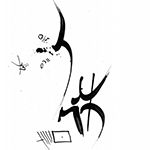
Hawad is a visual artist and poet originally from the Aïr region in the central Sahara. He is the author of multiple collections of poetry, including the recent Furigraphie: Poésies, 1985-2015.

 BACK TO ISSUE
BACK TO ISSUE



